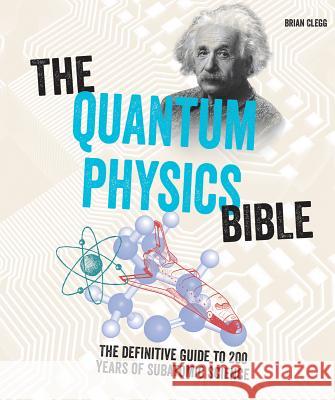The Quantum Physics Bible: The Definitive Guide to 200 Years of Subatomic Science » książka
The Quantum Physics Bible: The Definitive Guide to 200 Years of Subatomic Science
ISBN-13: 9781770859920 / Angielski / Miękka / 2017 / 320 str.
An easy-to-understand guide to the complex subject of quantum physics. Quantum physics is how scientists describe the world of the very small. For other people, however, the rules of quantum physics seem to violate all logic: How can a particle be in more than one place at the same time? How can it tunnel through an impenetrable barrier? How can a cat in a box be both alive and dead? This book explains the complexities of quantum physics in bite-sized "lessons" that make it clear and accessible to all readers. The sections and chapters are: 1. Atoms -- quantum; quantum physics in everyday life; the periodic table; atoms and nuclei; isotopes; hydrogen atom (energy levels and spectra) 2. Photons -- photoelectric effect; thermal emission and the Planck distribution; wave particle duality (Young's slit experiment) 3. Quantum devices -- superconductors; transistor, diode; light-emitting diode; laser 4. Spin -- spin; fermions; exclusion principle; Fermi Dirac distribution; Bose-Einstein statistics 5. Wave Mechanics -- Heisenberg uncertainty principle; wave functions; standing waves; wave particle duality 6. Subatomic Particles -- radioactivity; atomic particles; protons; neutrons; electrons 7. Particle Physics -- elementary particles; quarks; leptons; electron and electron neutrino; muon and muon neutrino; tauon and tau neutrino; bosons; photon; W and Z boson; gluon; Higgs boson; composite particles; hadrons; matter-anti-matter 8. Quantum Physics in Medicine and industry -- magnetic resonance imaging; superfluidity; cancer treatment by radiation 9. Into the Future -- quantum physics of space; quantum gravity; graviton; Hawking radiation (grand unified theory); dark matter; strings; dark energy. Throughout the book, there are timelines and profiles about the scientists who developed the theories and made important discoveries in quantum physics, including Dmitri Rutherford, Albert Einstein, Heike Kamerlingh Onnes, William Shockley, Isama Akasaki, Stephen Hawking, Enrico Fermi, and Max Born.











